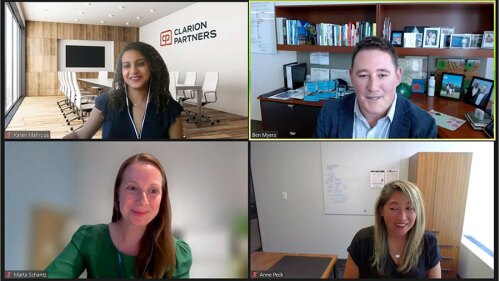Women in the real estate and land use industries have strong ambitions to lead companies and are willing to make multiple moves or start their own companies in order to advance their careers, according to a panel discussion of a report developed by the ULI Women’s Leadership Initiative (WLI); the discussion took place at the 2015 ULI Fall Meeting in San Francisco.
The report, Women in Leadership in the Real Estate and Land Use Industry, examines the current state of women in the industry as well as identifies the most effective strategies firms can put in place to advance more women to positions of seniority and visibility. The report found that among the 1,234 female members of ULI surveyed for the study (roughly 19 percent of ULI’s female membership), 68.6 percent aspire to hold C-level positions or own their own business at some point in their career. This figure reflects a general sense of optimism and ambition among the respondents about their careers and their own potential, said Sally Colella, the WLI research fellow who conducted the study; she is a Washington, D.C.–based leadership coach.
Yet, the aspirations of women in real estate stand in contrast with the current reality in which few make it to the top tier of major companies. Among all ULI members who are chief executives, executive directors, or the top officers in their organizations, only 14 percent are women. The survey suggests that it is within small or medium-sized companies that women are achieving their leadership potential. Of those survey respondents who are CEOs, 93 percent lead companies with fewer than 100 employees; a large number of these companies are sole proprietorships.
The survey also yielded insights into the types of approaches women have found most useful for advancing their careers. The survey asked respondents to evaluate a number of formal as well as informal strategies that they may have experienced in the workplace. By and large, respondents rated informal approaches—such as visible and challenging job assignments, sponsorship by a senior-level colleague, and a generally inclusive workplace culture—higher than formal training programs and workplace policies, including maternal and family leave and workplace flexibility arrangements.
Colella summarized the prevailing attitude of the respondents this way: “‘Don’t give me a training program without changing how we work on a day-to-day basis,’” she said. “What is most important is what happens every single day.”
In addition to surveying ULI members, WLI researchers convened focus groups in four major U.S. cities to gather information from women at various stages of their real estate careers. The report also includes five case studies of companies that are doing exemplary work in advancing women to leadership roles and developing an inclusive workplace culture that values the contributions of women at all levels.
The panel featured representatives of companies that have developed internal cultures that prize diversity in gender, ethnicity, and viewpoint. For some women, their companies have provided a level playing field where employees are measured by the merit of their work and ideas. This has been liberating and empowering for women eager to seize opportunities presented to them. “If women can be part of a meritocracy, that can be very powerful,” said MaryAnne Gilmartin, president and CEO of New York City–based Forest City Ratner Companies, one of the firms profiled in a case study.
The WLI report confirms Gilmartin’s view, with survey respondents saying informal processes, like offering women challenging work assignments, can influence a woman’s ability to advance more so than formal policies or programs. Kathleen Carey, ULI chief content officer and moderator of the panel, gave an example from her own career: her supervisor at GE Capital told her to go for a “line job,” one where she managed a profit and loss statement and was held accountable for a GE business line.
But sometimes formal processes work, too, to ensure that women are recruited for high-visibility positions. Panelist Andy Cohen, who shares the CEO position at Gensler with Diane Hoskins, said his company’s emphasis on collaborative leadership encourages cooperation among team members and the inclusion of many different perspectives in strategic decision making. Gensler has also created a series of training programs to facilitate cross-cultural collaboration and project management for its more than 5,000 employees in 46 cities around the world.
The discussion often returned to the importance of creating a workplace culture that values collaboration, entrepreneurship, and flexibility—particularly as men and women both shoulder more caregiving duties at home. “In the life cycle of a woman’s career, there are lots of exit ramps, but not a lot of entrance ramps,” Gilmartin said.
Technology also will play a critical role in equalizing opportunity and in the retention of talent by creating more flexibility—helping employees meet the demands of both career and life outside work.
Calling herself a member of the “sandwich generation” that is caring for both young children and aging parents, panelist Stephanie Haynie Wiggins, executive vice president and chief investment officer of the AFL-CIO Housing Investment Trust, said companies that prioritize work/life balance will be able to retain employees who want to perform highly both at work and at home. With the fierce competition for talent and a shrinking workforce, companies cannot afford to lose high-performing employees who feel they have reached a glass ceiling for their ambitions. “We don’t have the luxury of kicking the baby birds out of the nest,” Wiggins said.
Ultimately, it appears that career advancement for women will depend as much on exceptional individuals as it will on large-scale institutional change. “Attach yourself to a good mentor and shadow them,” Wiggins said. “Make sure you’re visible and say to yourself, ‘I deserve to be here.’”





